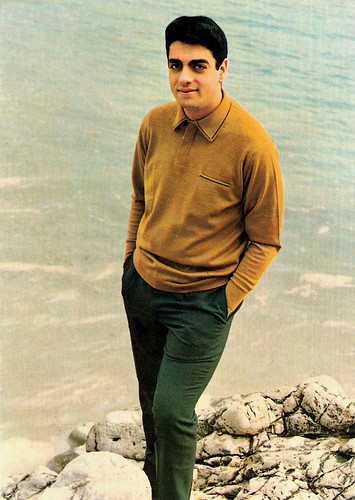
French postcard by Edition Borde, Paris, no. 123. Photo: Neuvecelle.
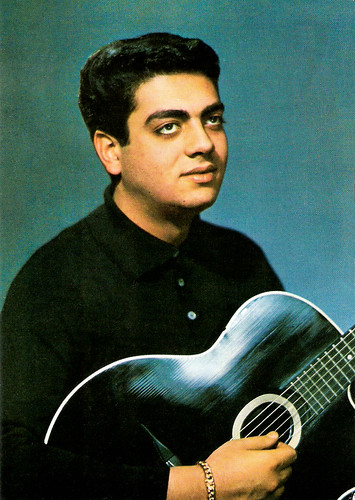
French postcard by E.D.U.G., no. 438. Photo: Sam Lévin.
Black feet
Enrico Macias was born as Gaston Ghrenassia in 1938 to an Algerian Jewish family in Constantine, Algeria (then French Algeria). His father, Sylvain Ghrenassia, was a violinist in the prestigious Cheikh Raymond Leyris Orchestra that played primarily Maalouf, the Arab-Andalusian music unique to Constantine. From his childhood on, Gaston played the guitar, and at the age of 15, he joined the Cheikh Raymond Leyris Orchestra. Later, he worked as a primary schoolmaster, but continued practising the guitar.
In 1961, the War of Independence was raging in Algeria, which had been a French colony since the nineteenth century. The situation became untenable for the Jewish and European residents of Constantine. On 22 June 1961, Cheick Raymond Leyris, who had just become the father-in-law of Gaston, was killed in Constantine. Gaston and his wife, Suzy Leyris, left Algeria in July 1961, eleven months before the end of the Algerian War of Independence.
They went into exile in France, and Gaston has not been permitted to return to Algeria ever since. First living in Argenteuil, he eventually moved to Paris, where he decided to pursue a music career. At first, he tried translating into French the Maalouf numbers, which he already knew. Later on, he developed a new French repertoire that he performed in cafés and cabarets. He remained, though, a popular interpreter of Arab-Andalusian music and Judeo-Arab songs in France. He adopted the name Enrico Macias. Enrico comes from being called ‘petit Enrico’ when he joined Cheikh Raymond's orchestra. Macias comes through an error of the record label with which he eventually signed. When asked about his family name on the phone, he said ‘Nassia’ (Ghrenassia), but the receptionist misheard the name and wrote Macias. Thus the name Enrico Macias.
He made his first recording in 1962 after a meeting with Raymond Bernard of Pathé. The result was the recording of Adieu mon pays, which he had composed for his beloved Algeria on the boat on his way to France. He appeared on French television in a program about the French citizens repatriated from Algeria, the Pieds Noirs (‘black feet’ - because they wore black shoes). Enrico became an overnight sensation. This led to a first tour in 1963 as a second act with Paola and Billy Bridge. His daughter, Jocya, was also born that year. In spring 1964, he performed in the first half of the Les Compagnons de la chanson show at the Paris Olympia and then undertook a successful tour of the Middle East, performing with great success in Israel, Greece and Turkey, especially in the latter, where he still has a huge following today. In Turkey, many of his songs were translated and interpreted by Turkish artists.
He also started to appear in films, such as Déclic et des claques/Clicks and Slaps (Philippe Clair, 1965) starring Annie Girardot. In 1965, he was awarded the Prix Vincent Scotto, and the following year he sang before 120,000 people at the Dinamo Stadium in Moscow, performing concerts in more than 40 other Soviet cities. He also toured Japan, where he was impressively successful. He recorded titles in Spanish and Italian and was popular in both countries.
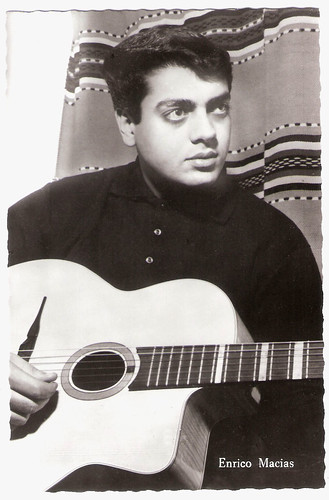
Dutch postcard.
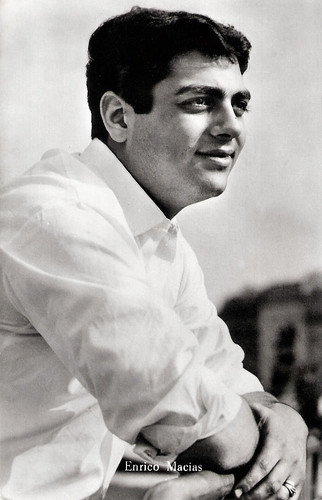
Dutch postcard by Gebr. Spanjersberg N.V. (Sparo), Rotterdam, no. 1263. Photo: Pathé.
Singer of peace
In 1968, Enrico Macias had a huge success in New York at a sold-out Carnegie Hall. He continued to tour the US, singing in Chicago, Dallas and Los Angeles. In Canada and Quebec, he was warmly welcomed as a francophone artist. In 1971, he returned to the Paris Olympia, then went to the Royal Albert Hall in London, and back to Japan, Canada, Italy and Spain. A second US tour culminated in another concert at Carnegie Hall in 1972. In 1974, he gave ten shows at the Uris Theatre on Broadway, and also at the Olympia for the sixth time since his debut. He toured France and went twice to Israel in 1976 and 1978. In 1976, he received a gold disc for his album 'Mélisa'.
In 1978, Macias was invited to Egypt by President Anwar El Sadat to sing for peace. This came after Macias had been banned from Arab countries for many years, despite keeping his popularity with Arab and ethnic audiences in the Middle East and North Africa. In Egypt, he sang in front of 20,000 people at the foot of the Pyramids. He was named Singer of Peace by UN Secretary-General Kurt Waldheim in 1981 after he donated the royalties of his single 'Malheur à celui qui blesse un enfant' to Unicef. After Sadat's assassination in 1981, Macias wrote the song 'Un berger vient de tomber', dedicated to the late president. In 1997, Kofi Annan named him Roving Ambassador for Peace and the Defence of Children.
In September 1982, after another tour of the United States, he performed for a month at the Olympia with his father Sylvain's oriental orchestra. Enrico Macias was awarded the Légion d'honneur, by French Prime Minister Laurent Fabius three years later. He had a big hit with 'Zingarella' (1988), particularly in Israel and Turkey, upon his tour in both countries, in addition to South Korea. His decision to try to play concerts in Algeria resulted in huge controversy. After the cancellation of a proposed tour in Algeria in 2000, he wrote a book, 'Mon Algérie' (2001), marketed as a ‘veritable love story between one man and his homeland’.
He took up acting and played parts in the film comedies La vérité si je mens! 2/Would I Lie to You? 2 (Thomas Gilou, 2001) and Les clefs de bagnole (Laurent Baffie, 2003). He also played the lead role as a local judge in the French TV film Monsieur Molina (Thierry Binisti, 2005) opposite Jean-Claude Drouot. In 2007, he created more controversy when he announced his support of Nicolas Sarkozy for the French presidential elections. He confirmed his political convictions of the political left, but said he could not support the Socialist candidate Ségolène Royal. That year, he attempted again unsuccessfully to visit Algeria, accompanying Sarkozy. He was faced with fierce resistance from several Algerian organisations and individuals, including Algerian Prime Minister Abdelaziz Belkhadem, due to his support of Israel.
A year later, his wife, Suzy Leyris, died after a long illness. Their son, Jean-Claude Ghrenassia, is a well-known music producer who produced his father’s albums 'Oranges Amères' (2003) and 'La Vie populaire' (2006). In 2009, Macias went through a difficult period when he lost several million euros placed in an Icelandic bank that went bankrupt. He came out of semi-retirement with amazing energy and the new album 'Voyage d’une mélodie', bursting with joyful songs. And as in the past, the 70+ singer went on a world tour. He also played again in several film comedies, including Bienvenue à bord (Eric Lavaine, 2011) starring Franck Dubosc, and La vérité si je mens! 3/Would I Lie to You? 3 (Thomas Gilou, 2012). In 2013, Gaston Ghrenassia legally changed his name to Enrique Macias. In 2019, he recorded the studio album 'Enrico Macias & Al orchestra' and appeared in the French television series Family Business, created and directed by Igor Gotesman. The plot revolves around a failed entrepreneur, Joseph (Jonathan Cohen), who finds out that cannabis is about to be legalized in France. He consequently decides to change the family kosher butcher shop into the first marijuana coffeeshop in France. The Netflix series was a success and got a second and third season. His most recent film is Maison de retraite 2/Retirement Home 2 (Claude Zidi Jr., 2023) with Jean Reno.
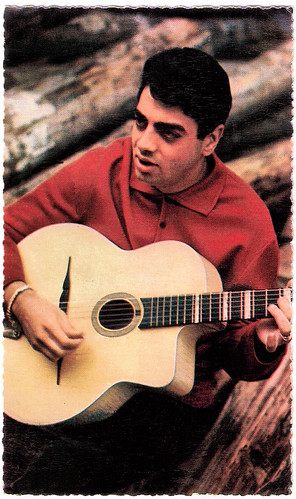
French postcard by Publistar, Marseille, no. 1107, offered by Corvisart. Photo: Gérard Neuvecelle / Pathé.
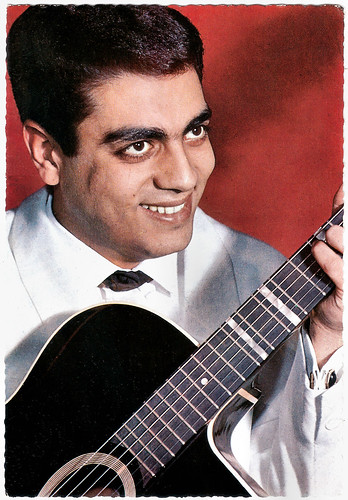
French postcard by PSG, no. 916. Photo: Mainbourg / Pathé.
Sources: RFI Musique (French), Wikipedia and IMDb.
This post was last updated on 18 April 2025.
No comments:
Post a Comment